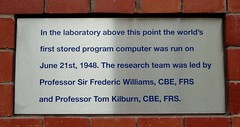Professor Tom Kilburn CBE FRS
Professor Tom Kilburn CBE FRS
(1921-2001)
Commemorated on 2 plaques
Sir Frederic Williams (1911-1977) and Tom Kilburn (1921-2001) Creators of the first Stored-Program Computer. Graduate and Professor of Electro-technics 1946-1977. Graduate and Professor of Computer Engineering & Computer Science 1960-1981.
Rutherford Building, Bridgeford Street, Manchester, United Kingdom where they was
In the laboratory above this point the world's first stored program computer was run on June 21st, 1948. The research team was led by Professor Sir Frederic Williams, CBE, FRS and Professor Tom Kilburn, CBE, FRS.
Rutherford Building, Bridgeford Street, Manchester, United Kingdom where they was


